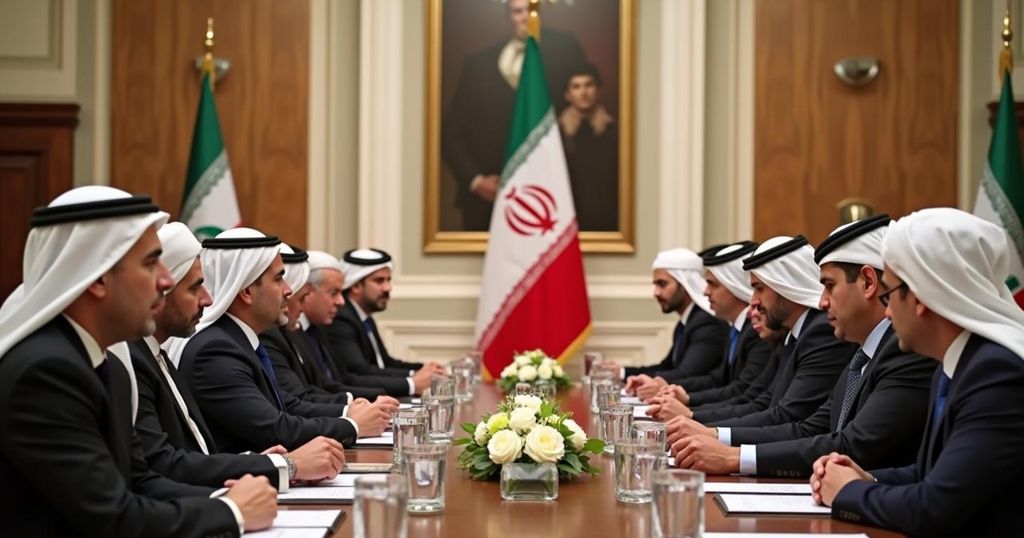Iranian Foreign Minister Abbas Araghchi met with Houthi official Mohammed Abdelsalam in Oman as part of a diplomatic tour amidst rising tensions following an Iranian missile attack on Israel. Discussions emphasized ending aggression in Gaza and Lebanon while aligning on diplomatic approaches to conflict resolution. Araghchi has previously met with officials from Iraq, Qatar, and Saudi Arabia to seek a ceasefire amid escalating regional conflicts.
On Monday, Iranian Foreign Minister Abbas Araghchi engaged in discussions with a prominent official from Yemen’s Houthi movement, Mohammed Abdelsalam, during a diplomatic visit to Muscat, Oman. This meeting is part of a broader diplomatic tour in the region. The Iranian Foreign Ministry has disseminated images from the discussions, highlighting Araghchi’s consultations with allies amidst escalating tensions following Israel’s declaration of retaliation after an Iranian missile attack. The official Iranian statement characterized Abdelsalam as the spokesman and chief negotiator of the Houthi’s National Salvation Government. The Houthi-managed Al Masirah Television reported on this meeting but refrained from disclosing specific details about their discussions. In addition to meeting with the Houthi representative, Araghchi also conferred with Oman’s Foreign Minister Sayyid Badr al-Busaidi. Together, they addressed the urgent need to halt what they referred to as the Israeli regime’s aggression and humanitarian crisis in Gaza and Lebanon. Iran’s foreign ministry spokesperson, Esmail Baghaei, emphasized the calls for an immediate cessation of hostilities. Oman, for its part, reaffirmed the significance of diplomacy as a foundational approach to resolving the ongoing disputes and conflicts throughout the region. This diplomatic engagement comes in light of a recent missile strike carried out by Iran against Israel, which saw nearly 200 missiles launched in what Iran labeled retaliation against recent targeted killings of their aligned leaders and force personnel. The Houthis, alongside Hamas in Gaza and Hezbollah, are categorized within Iran’s “axis of resistance,” which stands in opposition to Israeli actions. Minister Araghchi’s trip to Oman followed visits to both Baghdad and neighboring countries, including Qatar and Saudi Arabia, focusing discussions on establishing a ceasefire in affected areas and containing the intensifying conflict. He reiterated Iran’s readiness for potential military engagement but stressed that the nation aims for peace rather than war.
In recent months, tensions in the Middle East have heightened significantly, particularly surrounding the actions and retaliations associated with Israel and Iran. Iran’s missile strike against Israel and the subsequent escalations can be traced back to the ongoing conflicts involving militant groups such as the Houthis, Hamas, and Hezbollah. These groups, aligned under Iran’s influence, are part of a broader strategy in regional geopolitics that opposes Israeli operations. The meetings among diplomatic leaders aim to stabilize the situation, avert further conflict, and establish a foundation for peaceful negotiations, amid violence and humanitarian crises in areas like Gaza and Lebanon.
The diplomatic engagements led by Foreign Minister Abbas Araghchi underline Iran’s strategy to deepen regional alliances while addressing emergent conflicts. The meetings with key figures in the Houthi movement and the Omani government reflect Iran’s commitment to resolving disputes through dialogue despite the backdrop of military escalation. With growing tensions and complex geopolitical dynamics at play, including calls for ceasefires and the cessation of hostilities, such diplomatic endeavors may form a critical pathway toward peace in an increasingly volatile region.
Original Source: www.voanews.com







